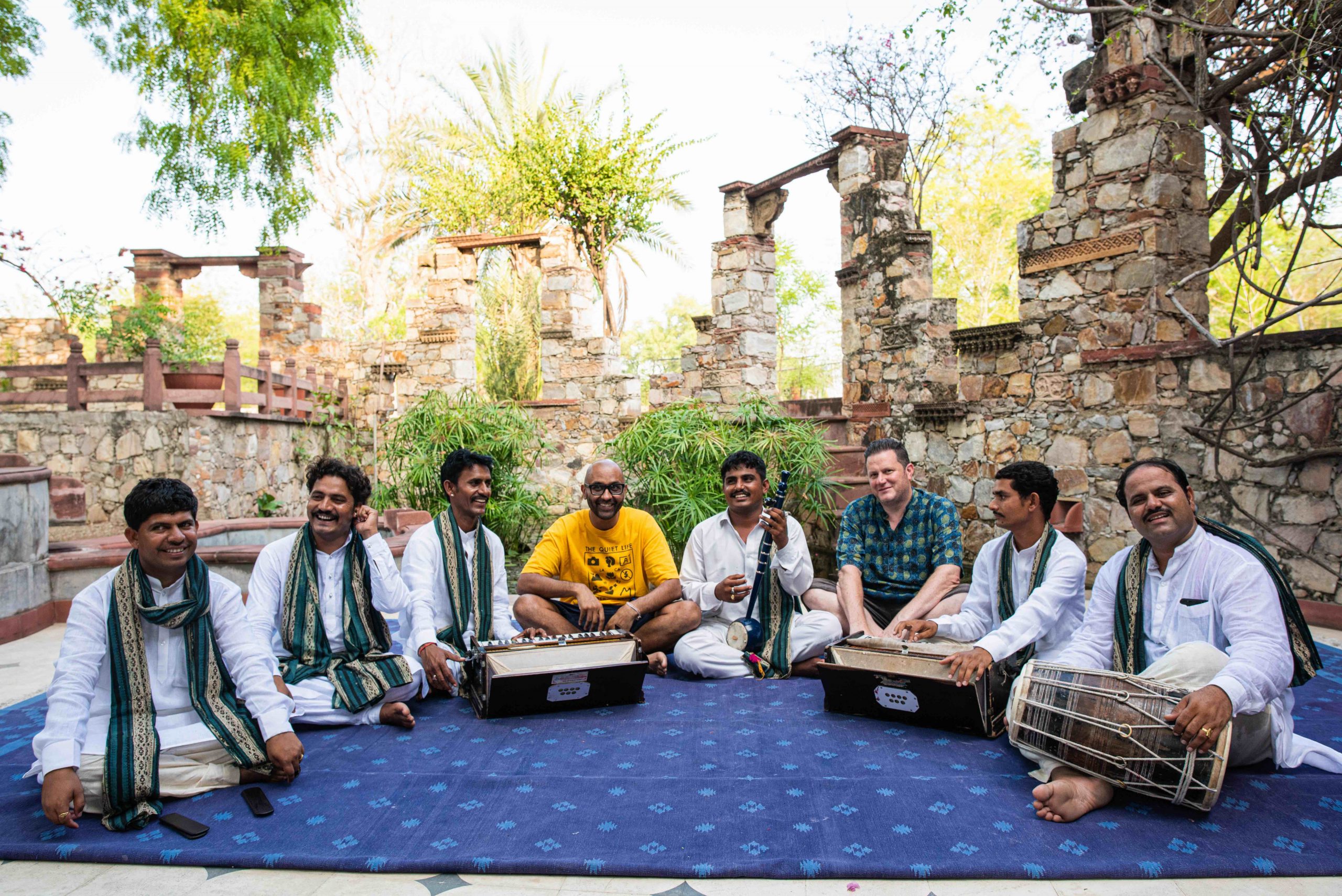Jason Singh & The Banwasi Collective

- Website
- Contact: Siân Williams - sian@riotsquadpublicity.com
Julie Allison - julie@riotsquadpublicity.com
Album title: Travellers
Release date: 22 September 2023
Label: Hudson Records
An ode to earthly and spiritual love, migration and the ever-changing landscape and climate of the desert state of Rajasthan Northeast India
Whatever he touches – whether that be composing for Sir David Attenborough’s Green Planet, creating immersive sound installations at Kew Gardens or vocally recreating birdsong and natural environments – sound artist and composer Jason Singhbrings sensitivity, nuance and soul. With diverse collaborations that include George Ezra, Rokia Traore, Sarathy Korwar, Talvin Singh and Shabaka Hutchings, his work is an ongoing exploration of the natural world and music technology. Travellers, with The Banwasi Collective is Singh’s latest undertaking; an exciting project from an artist who we’ve come to expect anything but the ordinary.
Released on Hudson Records on 22 September, ‘Travellers’ is a collection of 8 tracks recorded and produced by Singh featuring a collective of master musicians and vocalists, most of them from the Manganiyar community of hereditary musicians based in Rajasthan, northeast India. The album embraces multiple genres, faiths and languages and pays homage to the natural environment of Rajasthan. ‘Travellers’ deeply inhales the landscape, stories, flora and fauna of this rich desert state, and exhales soul-searing songs of travel, love and longing.
Featuring traditional instruments such as the ancient khartal, morchang, bhapana, dholak kamaicha, harmonium, dhol and dholak, the album focuses on Sufi culture and the significant impact of climate change on that part of the world. ‘Travellers’ was recorded entirely on location at Anokhi Farm in Jaipur, Rajasthan with additional recordings made in London. It is interwoven with references to the natural environment, making the landscape of Rajasthan the crucial seventh member of the Banwasi Collective.
Indeed, the album’s first track, ‘Runalayo’ opens with murmured conversation and birdsong collected by Singh using binaural microphones setting a multisensory stage for an ancient tale sung by Bhutta Khan in the Sindhi language. On ‘Doonghar Dukham Dhey’ flourishes of the khartals (castanet-style percussion) mastered by Bhungar Khan are inspired by the fluttering of a bird’s wings.
“The way they play, the whole sound is in tune with nature. That seven-beat cycle in Gypsy – to me, that is absolutely the walk of the camel and of carts piled high, making their way across the desert. Different rhythmic cycles, Manjoor would tell me, it’s this or that rhythm of horses’ hooves.” – Jason Singh
The song, ‘Banwasi’, meaning ‘forest dwellers’, gives the collective their name. The words were written by the great 16th-century poet saint Tulsidas, who tells us of Lord Rama’s banishment to the forest for a fourteen-year exile. Singh incorporates binaural (immersive audio) and re-pitched field recordings of birdsong, transporting the listener to an ancient mythical forest. This song, and the title of the album are afforded particular poignancy given the rural background of its artists, and their precarious position as India races towards urbanisation.
‘India, like much of the rest of the world, is in ecological tumult. Between 1880 and 2013, some forty per cent of its forest cover disappeared. It has lost a third of its wetlands in the past few decades, and a third of its grasslands in just a ten-year span’ – Dorothy Wickenden, ‘The Promise and the Politics of Rewilding India’, The New Yorker
It was the late John Singh and his wife Faith who set up the responsible textile company Anokhi in 1970 and the track ‘Memories of You’ was inspired by him. “There are peacocks wandering free all over the Anokhi Farm,” says Singh, and “John Singh, to whom this album is dedicated, loved his peacocks.”
Peacocks are also the symbol of Lord Krishna, the playful Hindu God beloved by Mirabai, the 16th- poet and author of Prem Diwani, the first single to be taken from the album. The track largely features Rajasthani instrumentation with subtle layers of guitar and bass by Arun Ghosh and David McEwan. With lyrics attributed to Mirabai, it tells how her love for Lord Krishna enraged her husband so much it drove him to attempted murder.
All the songs on ‘Travellers’ are based on different raags, the Indian music system of notes and moods, each evoking different seasons, times of day and references to nature. It is extraordinarily diverse – with references to Sufi poetry, Hindu mythology and Sassi Punnun, one of the four popular tragic romances of the Punjab. Songs are in Hindi, Urdu, Marwari, Sindhi and Saraiki and take the listener on an immersive journey across religions, water and dry arid landscapes, between Bhakti and Sufi, mortal and divine.
About Jason Singh & ‘Travellers’
Although UK-based, Jason Singh has an intimate and complex relationship with India. His own family were forced to flee India during the Partition of 1947 and his grandmother, given the atrocities she had witnessed at the time, firmly warned her children and grandchildren never to return. Jason did return though, accompanying his parents on the pilgrimage to Dharamsala, India, at the age of five, then going back as an adult when he encountered the Manganiyar community of Rajasthan. In the stories, rhythms and songs of these travelling pedlars of music, Singh discovered a deep commonality with the bhatra sanghat. Singh is himself a part of a community of Sikhs who migrated to the UK, who share linguistic, musical and professional links with the Manganiyars. In the dholak drums of Rajasthan, featured throughout this album, Singh heard the rhythms and touch he knew from the tabla players (the ragis) he’d encountered in the gurudwaras of East London. He has been unfolding the layers of his musical, spiritual and familial connections to the Indian subcontinent ever since, and this album, dedicated to John and Faith Singh, is a significant recognition of this continuous journey.
High Res Photos: Download Zip Folder








